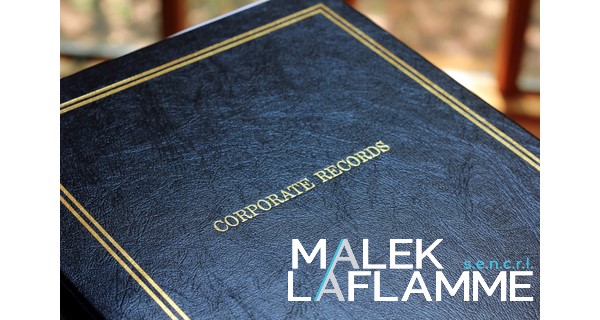We lost our minute book: Now what?
business law incorporate lawyer minute book resolutions share capital sharesCorporate book, minute book, company book, whatever you want to call it, for many corporations this (in)famous book is quietly gathering dust on a shelf.
In a previous post, we discussed the importance of keeping the corporate book up to date. But what should entrepreneurs do should they unfortunately lose their minute book? As it is often moved around from one place to the other (the company’s head office, the accountant’s office, the bank’s local branch, the lawyer’s office or at the various shareholders’ residences) such a scenario occurs far too often.
As you might expect, unless you have saved an e-copy of your entire book, there is no miracle solution here. The entrepreneur will usually work with his lawyer to assemble a new book which will reflect, as accurately and thoroughly as possible, the content of the previous one.
The first step should be determining and locating any and all relevant book documents which were, for whatever reason, not kept in the minute book (whether they be originals or copies). For example: share certificates, agreements, forms, declarations, shareholders agreement, etc. At this time, you may want to contact the corporation’s bank and corporate law firm as they frequently keep some of these documents on file. You should also get in touch with the corporation’s accountant and review your latest financial statements. These statements may provide valuable data such as issued share capital, identity of shareholders and any paid dividends.
The second step is to order copies of all minute book documents found in various government registries, such as the Registraire des entreprise du Québec. These registries may be a treasure trove of corporate documents (ex: articles of incorporation, articles of amendment, forms, declarations and notices).
Once all of the above documents are identified, compiled and analysed, we may start drafting the pertinent resolutions and declarations to better reflect this process in the new book. A fresh set of by-laws and new share certificates are also usually required. Obviously, a minute book lost by a corporation that has been operating for several years presents a much bigger challenge than working with a recent start-up, but the steps described above remain essentially the same. The task will also be more demanding where many changes to the corporate history had occurred (ex: change in directors, shareholders, shareholding, etc.), thus requiring a more thorough review.
Despite our best efforts, it is sometimes impossible to locate all relevant documents and/or contact all past stakeholders (a deceased former shareholder or an untraceable former executive for example). If you find yourself in such a situation, the execution of what are commonly known as “whitewash resolutions” will help in filling these gaps. Based partly on the documents on hand and partly on information provided by the current directors and shareholders of the corporation, these resolutions acknowledge and ratify past transactions and decisions. They also confirm actual data to bring the book and the company’s corporate history back on track and up to date.
Declarations of lost share certificates and the drafting of new shareholders, directors, securities and transfer ledgers are added to the mix.
When all is said and done, buy a new corporate book and insert all these documents under the appropriate tabs.
There it is, a brand new minute book! This time, why not leave it at your friendly neighbourhood lawyer’s office for safe keeping and updating?
Any questions or ideas for our next article? Please contact us at the 514-856-5601 (320) or at malek@maleklaflamme.ca.
